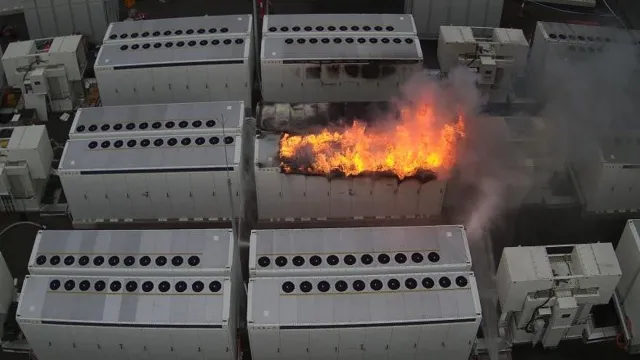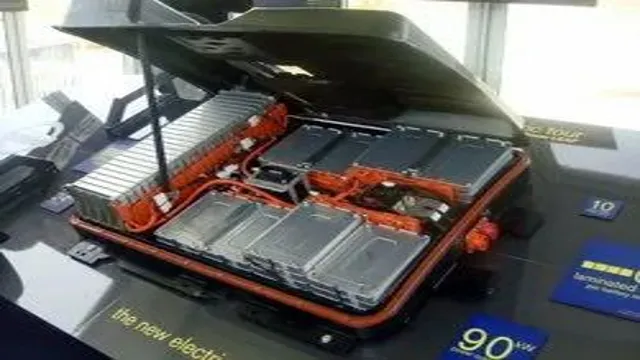Uncovering the Truth Behind Electric Car Lithium Battery Fires – A Guide to Understanding the Risks and Solutions
Electric cars are quickly becoming the transportation mode of choice for a growing number of people. The idea of environmentally friendly vehicles attracts many drivers who want to reduce their carbon footprint, and the benefits of electric cars are often touted as being numerous. However, as with any new technology, there are some concerns that need to be addressed.
One of the most pressing worries is whether lithium batteries used in electric cars can be prone to fires. This is a serious matter and needs careful consideration. In recent years, there have been several high-profile incidents in which lithium batteries have caught fire.
While such occurrences are still relatively rare, they have understandably caused a great deal of concerned discussion in the media. As electric cars become more popular, it’s important that we address the potential risks associated with lithium batteries. Although there is no denying the undeniable benefits of electric cars, we cannot ignore the fact that these batteries pose potential safety concerns.
There is a small risk of fire if the battery is not managed or maintained properly. This may happen if the cells inside the battery are punctured, and they come into contact with a conductive material or overheating due to overcharging. In many ways, the issue of electric car battery fires is similar to that of conventional cars’ gasoline catching fire.
The cars themselves are not dangerous as long as basic safety measures are in place. It’s essential to recognize that any new technology brings new risks, and as consumers, we must be educated about how to manage those risks safely. With proper care and attention, however, electric cars can be an excellent transportation choice for drivers looking to lower their carbon footprint and enjoy all the benefits of this clean and convenient technology.
Introduction
Electric car lithium battery fires have been a growing concern for many years. While electric vehicles are greener and better for the environment, there is no denying the fact that their batteries can burst into flames spontaneously. Lithium-ion batteries are the most commonly used batteries, and they are prone to short-circuits, overheating, and thermal runaway.
When these events occur, they can cause the battery to explode. There are many factors that contribute to the risk of a lithium battery fire, such as overcharging, over-discharging, and puncturing the battery. It is imperative for electric vehicle owners to be aware of the potential dangers and take precautions to prevent accidents.
Proper maintenance, monitoring the battery’s condition, and regular checks can reduce the risk of a battery fire significantly. Moreover, automakers are finding innovative solutions to reducing the risks of battery fires. For instance, Tesla has introduced a battery cooling system that helps regulate the temperature during high-stress events.
Other companies are exploring new types of batteries that are less susceptible to thermal runaway. In conclusion, lithium battery fires are a concern for the electric vehicle industry, but proper awareness and maintenance can help combat the occurrence of accidents. It is important to recognize the potential dangers of these batteries and take precautions to ensure the safety of both the driver and other passengers on the road.
What are Lithium Batteries?
Lithium batteries are a type of rechargeable battery that have become increasingly popular and widely used in recent years due to their high energy density and long lifespan. Unlike traditional disposable batteries, lithium batteries are designed to be recharged multiple times and can hold a significant amount of energy within a small, compact size. This makes them ideal for use in portable electronic devices, such as smartphones, laptops, and cameras, as well as larger applications like electric vehicles and power tools.
Additionally, lithium batteries are known for their stability and safety, with several safety features built into their design to prevent overcharging or overheating.Overall, lithium batteries are an innovative energy storage solution that have revolutionized the way we use and consume energy.

Why are Lithium Batteries in Electric Cars?
Electric cars are becoming increasingly popular due to their lower carbon emissions and potential to reduce the impact of climate change. One of the reasons why lithium batteries are used in electric cars is because they are lightweight and have a high energy density. This means that they can store a lot of energy while taking up less space and weight, which is essential in electric cars where space and weight are limited.
Additionally, lithium batteries have a longer lifespan compared to other battery types, and they can hold their charge even when they are not being used for a long time. This makes them very reliable and ideal for use in electric cars. Moreover, lithium is a readily available element that can be found in almost every region in the world, making it easier to source and manufacture lithium batteries for electric cars.
Ultimately, lithium batteries in electric cars provide a safe, low-maintenance and cost-effective solution for powering electric vehicles without harming the environment.
Electric Car Lithium Battery Fires: The Risk
Electric car lithium battery fires have become a major concern for both automakers and consumers alike. As more and more people turn to electric vehicles, the risk of battery fires increases. Lithium batteries contain a flammable electrolyte, which can ignite if there is a short circuit.
Although the risk of a battery fire in an electric car is relatively low, the consequences can be severe. The batteries in electric cars are much larger than those in traditional gas-powered vehicles, and therefore, they can burn for longer periods and release more energy. This can pose a significant risk to the occupants of the car and anyone nearby.
As a result, automakers are working hard to improve the safety of electric vehicle batteries and reduce the risk of fires.
Causes of Electric Car Lithium Battery Fires
Electric car lithium battery fires have been making headlines in recent years, causing concern among consumers and regulators alike. There are several potential causes of these fires, including manufacturing defects, damage to the battery during use or charging, and improper handling or storage of the battery. In some cases, these fires have been linked to thermal runaway, a process in which a single overheating cell in a battery can trigger a chain reaction that leads to a catastrophic failure.
To prevent these fires, manufacturers are taking steps such as improving battery design, implementing better testing and quality control procedures, and developing new safety features. As the popularity of electric cars continues to grow, it is likely that we will see continued efforts to reduce the risk of lithium battery fires.
Overheating of the Battery
Overheating of the Battery is one of the most common reasons behind Electric Car lithium battery fires. Lithium-ion batteries used in Electric Cars are a reliable and efficient power source. However, if they get too hot, they can quickly become dangerous.
One of the primary causes of overheating is overcharging the battery. When a battery is charged beyond its capacity, it generates excessive heat, leading to a risk of fire or explosion. Other factors that can contribute to battery overheating include poor cooling systems, external heating sources, and manufacturing defects.
Ensuring proper maintenance of the battery and checking for any signs of damage or wear regularly can help prevent battery overheating. If you suspect any issues with your Electric Car battery, it’s crucial to take it to a professional for diagnosis and repair to avoid any safety risks.
Short Circuiting of the Battery
Short Circuiting of the Battery One of the major causes of electric car lithium battery fires is a short circuit in the battery. A short circuit occurs when an electrical current meets resistance due to a direct connection between the positive and negative electrodes of the battery. This can cause the battery to heat up and combust, leading to a fire.
Short circuits can happen due to various reasons, such as faulty manufacturing of the battery, damage to the battery, or overcharging or undercharging of the battery. Therefore, it is important to regularly inspect and maintain electric car batteries to ensure they are functioning properly and to avoid potential short circuit hazards. Additionally, electric car manufacturers have implemented safety features to prevent short circuits, such as battery management systems that monitor the battery’s temperature and charge levels and regulate their performance.
As electric cars continue to grow in popularity, proper maintenance and safety measures will be crucial to ensure the safe operation of these vehicles.
Impact on the Battery
Electric car lithium battery fires are a rare but concerning occurrence. These incidents can result from various reasons such as manufacturing defects, accidents, improper charging, or extreme weather conditions. One of the primary causes of electric car lithium battery fires is overcharging, which can lead to thermal runaway and an increase in temperature.
Moreover, when electric vehicle batteries are exposed to high temperatures, they can also suffer from thermal degradation, which impacts their performance and lifespan. Additionally, physical damage to the battery pack or internal circuitry can also cause short circuits, leading to overheating and eventually, a fire. As a result, electric car owners should be mindful of their vehicle’s battery condition and follow the manufacturer’s guidelines for charging, storage, and maintenance.
By doing so, they can protect their battery from potential hazards and extend its lifespan.
Preventing Electric Car Lithium Battery Fires
As the electric vehicle market continues to grow, concern around the potential for lithium battery fires is growing as well. The good news is that automakers and battery manufacturers are taking significant steps to prevent these types of fires from occurring in the first place. One preventative measure is the implementation of advanced battery management systems that carefully monitor battery temperature, pressure, and charge levels.
Additionally, proper battery pack design and storage can also help prevent fires. For example, some EV manufacturers are separating individual battery cells to reduce the likelihood of a chain reaction occurring if one cell malfunctions. The use of high-quality materials and strict safety regulations also play a vital role in preventing electric car lithium battery fires.
Despite the rare occurrence of these types of fires, it is reassuring to know that the industry is taking proactive steps to ensure that they do not become a more significant safety issue in the future.
Integration of Thermal Management Systems
As electric cars become more popular, preventing lithium battery fires is a top concern for manufacturers. One of the ways they are doing this is through the integration of thermal management systems. These systems are designed to regulate the temperature within the battery pack, preventing overheating and potential fires.
The systems use a combination of active and passive cooling, such as liquid cooling, air cooling, and phase change materials, to maintain a safe temperature range for the battery. This is crucial because even a small increase in temperature can cause the battery to degrade, increasing the risk of fires. Integrating thermal management systems is just one of the ways that electric car manufacturers are working to make their vehicles safer and more reliable.
Improved Battery Design
Electric car manufacturers are constantly striving to improve battery design to prevent lithium battery fires. Lithium-ion batteries can be volatile and dangerous if not handled properly. One way to prevent fires is to use thicker separators between the battery cells.
This helps reduce the risk of short circuits and thermal runaway, which can lead to fires. Additionally, manufacturers are developing more advanced monitoring systems that can detect and prevent battery overheating. Another approach is to incorporate better cooling systems to prevent batteries from getting too hot.
By continually improving battery design, electric car manufacturers aim to make electric vehicles safer and more reliable.
Conclusion
In conclusion, while the idea of an electric car lithium battery fire may seem alarming, it’s important to remember that any source of energy carries some level of risk. Yes, these incidents can happen, but they are extremely rare and often preventable with proper maintenance and care. Plus, the benefits of electric cars in terms of sustainability and reduced emissions far outweigh the potential dangers.
So let’s keep charging forward with innovative technologies and renewable energy sources, always mindful of safety and sustainability.”
FAQs
What is the likelihood of an electric car lithium battery catching fire?
Electric car lithium batteries have a low likelihood of catching fire, but it is still possible. According to a National Highway Traffic Safety Administration report, the risk of a fire in an electric vehicle is the same or slightly lower than in a gasoline-powered vehicle.
Can the use of lithium batteries in electric cars be potentially dangerous?
Lithium batteries used in electric cars can potentially be dangerous if they are damaged or exposed to extreme temperatures. It is essential to follow manufacturer guidelines for handling and maintaining electric cars to avoid any safety hazards.
What measures are being taken to prevent lithium battery fires in electric cars?
Electric car manufacturers are implementing several measures to prevent lithium battery fires, such as using fire-resistant battery casings, developing battery systems that isolate damaged cells, and conducting extensive testing on battery components.
What should I do if my electric car lithium battery catches fire?
If your electric car lithium battery catches fire, move away from the vehicle and call emergency services immediately. It is crucial not to attempt to put out the fire yourself, as lithium batteries emit toxic gases and require specialized equipment and expertise to handle safely.






